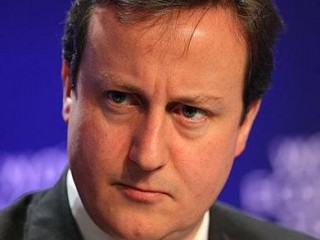
David Cameron biography
Date of birth : 1966-10-09
Date of death : -
Birthplace : London, England, UK
Nationality : British
Category : Politics
Last modified : 2011-08-11
Credited as : Politician, Prime MInister of United Kingdom, Conservative Party
0 votes so far
Cameron, a descendant of King William IV, was born into a family with both wealth and an aristocratic pedigree. He attended Eton College and Brasenose College, Oxford, from which he graduated (1988) with a first-class degree in philosophy, politics, and economics. After Oxford he joined the Conservative Party Research Department. In 1992 he became a special adviser to Norman Lamont, then chancellor of the Exchequer, and the following year he undertook the same role for Michael Howard, then home secretary. Cameron joined the media company Carlton Communications in 1994 as director of corporate affairs. He stayed at Carlton until entering Parliament in 2001 as MP for Witney, northwest of London.
Cameron quickly attracted attention as the leading member of a new generation of Conservatives: young, moderate, and charismatic. He was widely compared to Labour Prime Minister Tony Blair, who had acquired a similar reputation when he entered Parliament 18 years earlier. After just two years as an MP, Cameron was appointed to his party's “front bench”—making him a leading Conservative spokesman in the House of Commons. In 2004 Howard, by then party leader, appointed his young protégé to the post of head of policy coordination, which put Cameron in charge of preparing the Conservatives' 2005 election manifesto. The party, however, suffered a heavy defeat at the polls, provoking Howard's resignation. Cameron's self-assured speech at the party's annual conference in October 2005 transformed his reputation, and he was subsequently elected Conservative leader.
Cameron sought to modernize the party and shed its right-wing image. He announced that economic stability and strong public services would be a priority over tax cuts in the next Conservative government. Under his leadership, the party grew in popularity and placed first in the 2006 local elections; it was the Conservatives' best showing at the polls in some 15 years.
In the immediate aftermath of Gordon Brown succeeding Blair as Labour leader and prime minister in 2007, the Conservatives began to trail in the polls, encouraging the prime minister to consider calling a snap election to capitalize on Labour's momentum. By the time Labour held its party conference in September, it had a double-digit lead over the Conservatives. But, at the Conservative Party conference in early October, Cameron made an impressive speech, talking for more than an hour without a script. In reference to the upcoming European Union summit in Lisbon to negotiate a treaty on reform, Cameron lambasted Brown for ruling out a referendum on an agreement (contrary to the prime minister's commitment to hold one on a European constitution). In addition to other issues, Cameron also was critical of Labour's performance on crime and with regard to the National Health Service.
The performance won wide praise, and in its aftermath Brown announced that there would be no general election before 2009. Later that month, after Brown had attended the EU summit in Lisbon, at which the 27 member countries agreed on the detailed wording of the treaty, Cameron followed up with his earlier criticism, arguing that Brown had “absolutely no democratic mandate to sign this without a referendum.” By December the Conservatives had taken a clear lead in the opinion polls, ahead of Labour by up to 13 percent—the biggest lead for the Conservatives since 1989.
The global economic crisis in 2008 helped Cameron solidify the Conservatives' position. Though Brown was widely praised outside of Britain for his approach to the crisis, his promise in 1997 that the days of economic "boom and bust" were over played to Cameron's advantage, as did an internal revolt by Labour ministers in 2008. In March 2009 Cameron made good on a promise to remove the Conservatives from the European People's Party, a mainstream alliance of conservative parties in the European Parliament. On June 4, 2009, the Conservatives topped the poll in the European Parliament elections, and Cameron had the Conservatives enter the legislative body as members of the European Conservatives and Reformists Group.
A parliamentary expenses scandal, which had been brewing since 2007, broke in May 2009 when the Daily Telegraph reported on widespread abuse by members of Parliament of expense accounts meant to offset the cost of having to maintain a second residence (the so-called Additional Costs Allowance). While the scandal cut across party lines, Labour suffered the brunt of public criticism, and Cameron responded by arguing that the public has a "right to be angry."
In the 2010 general election held on 6 May, the Conservatives won 307 seats in a hung parliament and Cameron was appointed Prime Minister on 11 May 2010, at the head of a coalition between the Conservatives and the Liberal Democrats. At the age of 43, Cameron became the youngest British Prime Minister since the Earl of Liverpool 198 years earlier. Cameron leads the first coalition government of the United Kingdom since the Second World War.
















